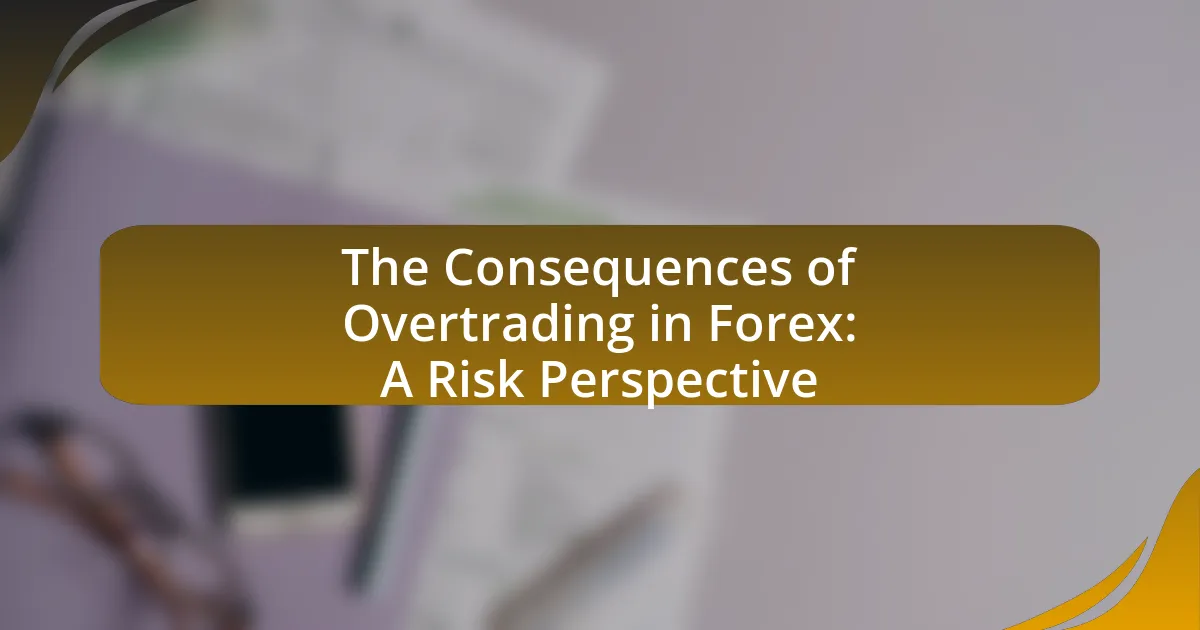The article focuses on the consequences of overtrading in Forex, highlighting its significant financial and psychological impacts on traders. It outlines how excessive trading leads to increased transaction costs, poor decision-making, and heightened emotional stress, which can result in substantial financial losses and decreased trading performance. The article also examines the psychological effects of overtrading, including anxiety and burnout, and discusses the role of trader psychology, market conditions, and lack of discipline in promoting overtrading behavior. Additionally, it provides strategies for preventing overtrading, emphasizing the importance of risk management, disciplined trading plans, and emotional control.

What are the Consequences of Overtrading in Forex?
Overtrading in Forex leads to significant financial losses and emotional stress for traders. When traders engage in excessive trading, they often incur higher transaction costs, which can erode profits. Additionally, overtrading can result in poor decision-making due to fatigue and emotional strain, leading to further losses. Research indicates that traders who overtrade are more likely to experience burnout and anxiety, which negatively impacts their trading performance. A study by the University of California found that emotional decision-making can lead to a 50% increase in trading losses among overtraders. Thus, the consequences of overtrading encompass both financial detriment and psychological challenges.
How does Overtrading Impact Forex Traders?
Overtrading negatively impacts Forex traders by increasing their exposure to risk and leading to potential financial losses. When traders engage in excessive trading, they often make impulsive decisions driven by emotions rather than analysis, which can result in poor trade execution and higher transaction costs. Research indicates that overtrading can lead to a significant decrease in profitability; for instance, a study by the CFA Institute found that traders who overtrade can incur losses of up to 50% of their capital due to increased fees and unfavorable market conditions. Additionally, overtrading can cause psychological stress, leading to further irrational trading behavior, compounding the negative effects on a trader’s performance.
What psychological effects does Overtrading have on traders?
Overtrading leads to significant psychological effects on traders, including increased anxiety, stress, and emotional instability. These psychological states arise from the pressure of making rapid trading decisions and the fear of missing out on potential profits. Research indicates that overtrading can result in cognitive overload, impairing decision-making abilities and leading to impulsive actions. A study published in the Journal of Behavioral Finance found that traders who engage in excessive trading often experience heightened levels of regret and frustration, which can further exacerbate their trading performance. This cycle of negative emotions can create a detrimental feedback loop, ultimately impacting traders’ mental health and financial outcomes.
How does Overtrading influence trading performance?
Overtrading negatively influences trading performance by increasing transaction costs and emotional stress, leading to poor decision-making. When traders engage in excessive buying and selling, they incur higher commissions and spreads, which can erode profits. Additionally, overtrading often results in fatigue and emotional strain, causing traders to deviate from their strategies and make impulsive choices. Research indicates that traders who overtrade are more likely to experience losses, as they may fail to adhere to risk management principles and become overwhelmed by market fluctuations. This behavior can ultimately diminish overall trading effectiveness and profitability.
What financial risks are associated with Overtrading?
Overtrading in Forex leads to significant financial risks, primarily including increased transaction costs, reduced profit margins, and heightened exposure to market volatility. Increased transaction costs arise from excessive trading activity, which can erode profits due to commissions and spreads. Reduced profit margins occur as traders may take on more positions than they can effectively manage, leading to losses that outweigh gains. Heightened exposure to market volatility results from rapid trading decisions, which can amplify losses during unfavorable market movements. According to a study by the CFA Institute, overtrading is linked to a 20% decrease in overall trading performance, highlighting the detrimental impact on financial outcomes.
How can Overtrading lead to significant financial losses?
Overtrading can lead to significant financial losses by increasing transaction costs and exposing traders to higher market risks. When traders engage in excessive buying and selling, they incur more commissions and fees, which can erode profits. Additionally, overtrading often results in poor decision-making due to emotional stress and fatigue, leading to uncalculated risks and potential losses. Research indicates that traders who overtrade can experience a 50% reduction in their overall profitability due to these factors, highlighting the detrimental impact of this behavior on financial outcomes.
What role does leverage play in the risks of Overtrading?
Leverage significantly amplifies the risks associated with overtrading by increasing the potential for substantial financial losses. When traders utilize leverage, they can control larger positions than their actual capital allows, which can lead to rapid losses if market movements are unfavorable. For instance, a leverage ratio of 100:1 means that a trader can control $100,000 with just $1,000 of their own capital. This high level of exposure can result in margin calls and forced liquidation of positions, exacerbating the financial impact of overtrading. According to a study by the Financial Conduct Authority, high leverage is a primary factor contributing to the high percentage of retail trader losses in Forex markets, highlighting the direct correlation between leverage and increased risk in overtrading scenarios.
Why is it important to understand the risks of Overtrading?
Understanding the risks of overtrading is crucial because it can lead to significant financial losses and emotional stress for traders. Overtrading often results in poor decision-making, as traders may act impulsively rather than following a well-defined strategy. Research indicates that traders who overtrade can experience a decrease in their overall profitability, with studies showing that excessive trading can reduce returns by up to 50%. Additionally, overtrading can lead to burnout and increased anxiety, which further impairs trading performance. Therefore, recognizing these risks allows traders to implement better risk management strategies and maintain a disciplined approach to trading.
How can awareness of Overtrading risks improve trading strategies?
Awareness of overtrading risks can significantly enhance trading strategies by promoting disciplined decision-making and risk management. Recognizing the psychological and financial pitfalls associated with overtrading helps traders avoid impulsive actions that can lead to substantial losses. For instance, studies indicate that traders who are aware of overtrading risks are more likely to implement stop-loss orders and adhere to predefined trading plans, which can reduce the likelihood of emotional trading. Furthermore, a report by the CFA Institute highlights that disciplined traders, who understand the consequences of overtrading, often achieve better long-term performance compared to those who do not. This awareness fosters a more strategic approach, allowing traders to focus on quality trades rather than quantity, ultimately leading to improved profitability and reduced risk exposure.
What are the long-term consequences of ignoring Overtrading risks?
Ignoring overtrading risks can lead to significant long-term consequences, including substantial financial losses, emotional distress, and damage to trading discipline. Financially, traders may experience account depletion due to excessive leverage and frequent trades, which can result in a series of losses that compound over time. Emotional distress often manifests as anxiety and stress, leading to poor decision-making and further losses. Additionally, the erosion of trading discipline can result in a cycle of impulsive trading behaviors, making it increasingly difficult for traders to adhere to their strategies. Studies indicate that traders who overtrade are more likely to face burnout and disengagement from the market, ultimately jeopardizing their long-term success and sustainability in trading.

What Factors Contribute to Overtrading in Forex?
Overtrading in Forex is primarily driven by emotional factors, lack of discipline, and inadequate risk management. Traders often experience emotions such as greed and fear, which can lead to impulsive trading decisions. For instance, a trader may overreact to market fluctuations, resulting in excessive trades that do not align with their strategy. Additionally, a lack of a well-defined trading plan can cause traders to enter and exit positions too frequently, further contributing to overtrading. Research indicates that traders who do not adhere to strict risk management principles are more likely to engage in overtrading, as they may not recognize the potential for significant losses.
How do trader psychology and emotions lead to Overtrading?
Trader psychology and emotions lead to overtrading primarily through impulsive decision-making driven by fear and greed. When traders experience fear of missing out on potential profits, they may enter trades without proper analysis, leading to excessive trading activity. Conversely, when traders are overly confident after a series of wins, they may ignore risk management principles, resulting in increased trading frequency. Research indicates that emotional trading can lead to a 50% increase in the number of trades executed, as traders react to market fluctuations rather than adhering to a disciplined strategy. This behavior often results in significant financial losses and heightened market volatility, reinforcing the cycle of emotional trading and overtrading.
What emotional triggers commonly result in Overtrading?
Emotional triggers that commonly result in overtrading include fear of missing out (FOMO), greed, and frustration. FOMO drives traders to enter positions impulsively to capitalize on perceived opportunities, often leading to excessive trading. Greed compels traders to chase profits, resulting in taking on more trades than warranted by their strategy. Frustration, often stemming from losses or unmet expectations, can lead traders to overcompensate by increasing their trading activity in an attempt to recover losses. These emotional states disrupt rational decision-making, contributing to a cycle of overtrading that can exacerbate financial losses.
How can fear and greed influence trading decisions?
Fear and greed significantly influence trading decisions by driving irrational behavior among traders. Fear often leads to panic selling, causing traders to exit positions prematurely during market downturns, which can result in losses. Conversely, greed can prompt traders to take excessive risks, leading to overtrading and potential financial ruin when they chase profits without proper analysis. Research indicates that emotional trading can lead to a 50% increase in the likelihood of making poor investment choices, as traders may ignore fundamental analysis in favor of emotional impulses. This emotional volatility can exacerbate market fluctuations, ultimately impacting overall market stability.
What market conditions promote Overtrading behavior?
Market conditions that promote overtrading behavior include high volatility, excessive leverage, and a lack of clear trading strategies. High volatility creates rapid price movements, enticing traders to make frequent trades in an attempt to capitalize on short-term fluctuations. Excessive leverage amplifies potential gains, leading traders to take on more positions than they can manage, increasing the likelihood of overtrading. Additionally, a lack of clear trading strategies can result in impulsive decisions, as traders may feel compelled to act on every market movement without a defined plan. These conditions collectively contribute to an environment where overtrading is more likely to occur.
How does high volatility affect trading frequency?
High volatility increases trading frequency as traders seek to capitalize on rapid price movements. In volatile markets, price fluctuations can be significant within short time frames, prompting traders to execute more trades to exploit these opportunities. For instance, during periods of high volatility, such as economic announcements or geopolitical events, trading volumes often surge, reflecting heightened activity. Data from the Forex market indicates that trading volumes can increase by over 100% during such events, demonstrating a direct correlation between volatility and trading frequency.
What role does market news play in Overtrading tendencies?
Market news significantly influences overtrading tendencies by creating emotional responses and urgency among traders. When traders react to breaking news or economic reports, they often make impulsive decisions, leading to excessive buying or selling. Research indicates that 70% of traders admit to making trades based on news events, which can result in increased transaction frequency and heightened risk exposure. This behavior is exacerbated during volatile market conditions, where rapid news cycles can trigger a cascade of trades, further intensifying overtrading.
How can a lack of trading discipline lead to Overtrading?
A lack of trading discipline can lead to overtrading by causing traders to deviate from their established strategies and risk management rules. When traders lack discipline, they may impulsively enter and exit trades based on emotions rather than analysis, resulting in excessive trading activity. Research indicates that traders who do not adhere to a disciplined approach often experience higher transaction costs and increased exposure to market volatility, which can exacerbate losses. For instance, a study published in the Journal of Finance found that traders who frequently overtrade tend to underperform compared to those who maintain a disciplined trading strategy, highlighting the negative impact of emotional decision-making on trading outcomes.
What are the signs of poor trading discipline?
Signs of poor trading discipline include inconsistent trading strategies, emotional decision-making, and failure to adhere to risk management rules. Inconsistent trading strategies manifest when a trader frequently changes their approach without a clear rationale, leading to erratic performance. Emotional decision-making occurs when traders allow fear or greed to influence their trades, often resulting in impulsive actions that deviate from their planned strategies. Additionally, failure to adhere to risk management rules, such as not setting stop-loss orders or risking more than a predetermined percentage of their capital on a single trade, can significantly increase the likelihood of substantial losses. These behaviors are widely recognized in trading literature as indicators of a lack of discipline, which can ultimately jeopardize a trader’s success in the Forex market.
How can establishing a trading plan mitigate Overtrading?
Establishing a trading plan can mitigate overtrading by providing clear guidelines and rules for entering and exiting trades. A well-defined trading plan helps traders set specific goals, risk management strategies, and criteria for trade selection, which reduces impulsive decisions driven by emotions. Research indicates that traders who adhere to a structured plan are less likely to engage in excessive trading, as they have predetermined limits on the number of trades and the amount of capital at risk. This structured approach fosters discipline and helps maintain focus on long-term objectives rather than short-term fluctuations, ultimately leading to more consistent trading performance.

What Strategies Can Help Prevent Overtrading in Forex?
To prevent overtrading in Forex, traders should implement strict risk management strategies, including setting a maximum number of trades per day and adhering to a well-defined trading plan. Establishing a daily trading limit helps maintain discipline and reduces impulsive trading decisions. Additionally, traders should utilize stop-loss orders to protect their capital and avoid emotional trading, which can lead to overtrading. Research indicates that traders who follow a structured approach, such as the one outlined in “The Psychology of Trading” by Brett N. Steenbarger, experience lower instances of overtrading and improved overall performance.
How can traders develop a disciplined trading plan?
Traders can develop a disciplined trading plan by establishing clear goals, defining risk management strategies, and adhering to a consistent trading routine. Setting specific, measurable, achievable, relevant, and time-bound (SMART) goals helps traders focus their efforts and maintain motivation. Risk management strategies, such as setting stop-loss orders and determining position sizes based on account equity, protect traders from significant losses. Additionally, a consistent trading routine, which includes regular analysis of market conditions and performance reviews, reinforces discipline and helps traders avoid impulsive decisions. Research indicates that disciplined trading practices can lead to improved performance and reduced emotional trading, as evidenced by a study published in the Journal of Behavioral Finance, which highlights the correlation between discipline and trading success.
What key components should be included in a trading plan?
A trading plan should include key components such as trading goals, risk management strategies, market analysis methods, entry and exit criteria, and performance evaluation metrics. Trading goals define the trader’s objectives, such as profit targets and timeframes. Risk management strategies outline how much capital to risk on each trade, often recommending a maximum of 1-2% of total capital per trade to mitigate losses. Market analysis methods specify whether to use technical analysis, fundamental analysis, or a combination of both to identify trading opportunities. Entry and exit criteria provide clear rules for when to enter or exit trades, ensuring decisions are based on predefined conditions rather than emotions. Finally, performance evaluation metrics allow traders to assess their trading results over time, helping to refine their strategies and improve future performance. These components are essential for maintaining discipline and consistency in trading, particularly in the volatile forex market.
How can setting clear trading goals reduce Overtrading?
Setting clear trading goals can significantly reduce overtrading by providing traders with a structured framework that defines their objectives and limits. When traders establish specific, measurable, achievable, relevant, and time-bound (SMART) goals, they create a roadmap that helps them focus on their trading strategy rather than impulsively entering and exiting trades. Research indicates that traders with defined goals are less likely to engage in excessive trading behaviors, as they have predetermined criteria for making decisions. For instance, a study published in the Journal of Behavioral Finance found that goal-setting can enhance self-regulation and discipline, leading to more consistent trading practices and reduced emotional decision-making. This structured approach minimizes the likelihood of overtrading, as traders are less prone to chase losses or react to market fluctuations without a clear plan.
What role does risk management play in preventing Overtrading?
Risk management plays a crucial role in preventing overtrading by establishing clear guidelines for position sizing, trade frequency, and loss limits. By implementing risk management strategies, traders can avoid excessive exposure to the market, which often leads to impulsive trading decisions driven by emotions rather than analysis. For instance, setting a maximum percentage of capital to risk on each trade helps maintain discipline and prevents traders from entering multiple positions simultaneously, a common cause of overtrading. Studies indicate that traders who adhere to strict risk management protocols experience lower instances of overtrading, as they are more likely to stick to their trading plans and avoid chasing losses.
How can position sizing help manage risk effectively?
Position sizing helps manage risk effectively by determining the appropriate amount of capital to allocate to a trade based on the trader’s risk tolerance and the specific characteristics of the trade. By calculating position size, traders can limit potential losses to a predetermined percentage of their total capital, which prevents significant drawdowns and preserves trading capital. For instance, if a trader decides to risk 1% of their capital on a single trade, they can calculate the position size based on the distance to their stop-loss level, ensuring that even in the event of a loss, the impact on their overall portfolio remains manageable. This methodical approach to risk management is supported by the principle that consistent application of position sizing can lead to more sustainable trading practices and improved long-term profitability.
What are the best practices for setting stop-loss orders?
The best practices for setting stop-loss orders include determining an appropriate percentage of loss to tolerate, placing the stop-loss order at a technical support level, and regularly adjusting the stop-loss as the trade becomes profitable. Traders often recommend setting the stop-loss at 1-2% of the trading capital to manage risk effectively. Additionally, placing the stop-loss just below a recent low for long positions or above a recent high for short positions can help protect against market volatility. Regularly adjusting the stop-loss to lock in profits as the trade moves favorably is also crucial for maximizing gains while minimizing losses. These practices are supported by risk management principles that emphasize the importance of protecting capital in trading strategies.
How can traders maintain emotional control to avoid Overtrading?
Traders can maintain emotional control to avoid overtrading by implementing strict trading plans and setting clear risk management rules. A well-defined trading plan includes specific entry and exit points, which helps traders stick to their strategy rather than making impulsive decisions driven by emotions. Additionally, setting a maximum loss limit for each trading session can prevent traders from chasing losses, a common emotional response that leads to overtrading. Research indicates that traders who adhere to structured plans and risk management strategies experience lower levels of emotional stress and make more rational decisions, thereby reducing the likelihood of overtrading.
What techniques can help manage trading-related stress?
Techniques that can help manage trading-related stress include mindfulness meditation, regular physical exercise, and maintaining a structured trading plan. Mindfulness meditation has been shown to reduce anxiety and improve focus, which can enhance decision-making in trading. Regular physical exercise releases endorphins, which can alleviate stress and improve overall mental health. A structured trading plan provides clear guidelines and reduces uncertainty, helping traders to stay disciplined and focused, thereby minimizing stress. Research indicates that these techniques can significantly improve emotional regulation and reduce the psychological impact of trading pressures.
How can mindfulness practices improve trading discipline?
Mindfulness practices can significantly improve trading discipline by enhancing emotional regulation and decision-making skills. Research indicates that mindfulness training helps traders become more aware of their thoughts and feelings, allowing them to respond to market fluctuations with greater composure. A study published in the Journal of Behavioral Finance found that traders who engaged in mindfulness practices exhibited lower levels of impulsivity and made more rational decisions, which directly correlates with improved trading outcomes. By fostering a focused and present mindset, mindfulness enables traders to adhere to their strategies and avoid the pitfalls of overtrading, ultimately reducing risk in Forex trading.
What are the best practices for avoiding Overtrading in Forex?
To avoid overtrading in Forex, traders should implement strict risk management strategies, including setting a maximum number of trades per day and adhering to a well-defined trading plan. Establishing clear entry and exit points helps prevent impulsive decisions driven by emotions. Additionally, maintaining a trading journal allows traders to analyze their performance and identify patterns that lead to overtrading. Research indicates that traders who follow structured approaches are less likely to experience the negative consequences associated with overtrading, such as increased transaction costs and emotional stress.
